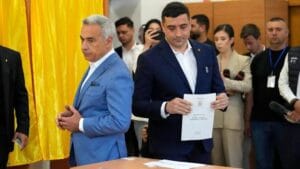South Korea seeks arrest of suspended President Yoon Suk Yeol
South Korea’s joint investigation unit has requested an arrest warrant for suspended President Yoon Suk Yeol over his controversial imposition of martial law earlier this month, an official confirmed on Monday.

South Korea’s joint investigation unit has requested an arrest warrant for suspended President Yoon Suk Yeol over his controversial imposition of martial law earlier this month, an official confirmed on Monday.
The investigation, conducted jointly by the police and the Corruption Investigation Office for High-Ranking Officials, seeks to determine whether Yoon’s December 3 declaration of martial law constitutes insurrection.
Yoon has repeatedly failed to comply with multiple summons for questioning. “This pattern of non-cooperation raises serious concerns about transparency and accountability,” said an official close to the investigation, speaking on condition of anonymity. A court will now decide whether to issue an arrest warrant for the embattled leader.
Yoon’s lawyer, Yoon Kab-keun, has remained silent amid the escalating controversy and did not respond to multiple inquiries. Critics argue that the lack of engagement from Yoon’s team is a deliberate tactic to delay legal proceedings. “The public deserves answers, not silence,” said opposition lawmaker Lee Ji-eun during a televised interview on Monday.
Yoon was impeached earlier in December, leading to his suspension from presidential powers. The Constitutional Court is currently deliberating whether to reinstate him or permanently remove him from office, with a decision required within 180 days. During the court’s first preparatory hearing on December 27, Yoon’s legal team requested a postponement to better prepare their defense, a motion that was swiftly denied. “This court is committed to ensuring a timely resolution for the people of South Korea,” the court stated in its ruling.
The court’s decision to expedite the process has drawn mixed reactions. “We must ensure that justice is not only served but also seen to be served,” said Kim Soo-min, a prominent legal scholar. Meanwhile, supporters of Yoon have accused the court of political bias, arguing that the process is being rushed to prevent a fair defense.
Yoon’s brief imposition of martial law has sparked widespread debate, with critics accusing him of attempting to consolidate power during a period of political instability. “His actions violated democratic norms and set a dangerous precedent for the future,” said Park Hye-jin, a human rights activist. However, some of Yoon’s allies argue that his decision was necessary to maintain order. “He acted in the nation’s best interest under extraordinary circumstances,” said Choi Min-ho, a former adviser to Yoon.
The next court hearing is set for Friday, with tensions running high as the investigation continues to unfold. “This case is not just about Yoon; it’s about the integrity of our democratic institutions,” said law professor Jung Hwan. “The outcome will have far-reaching implications for South Korea’s future.”










